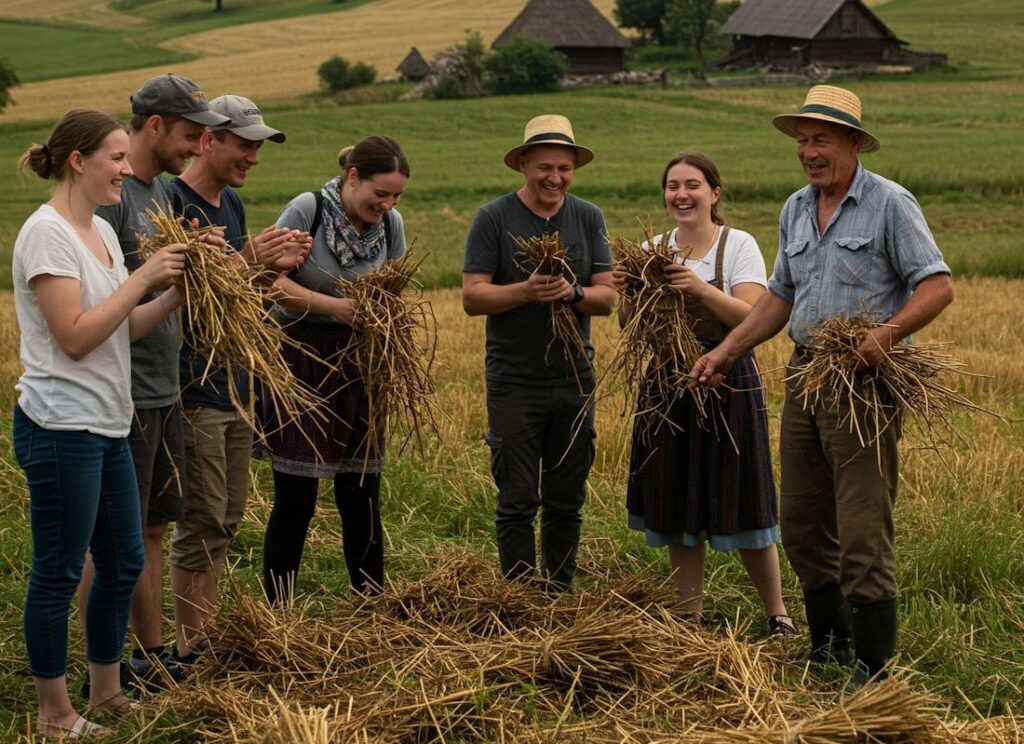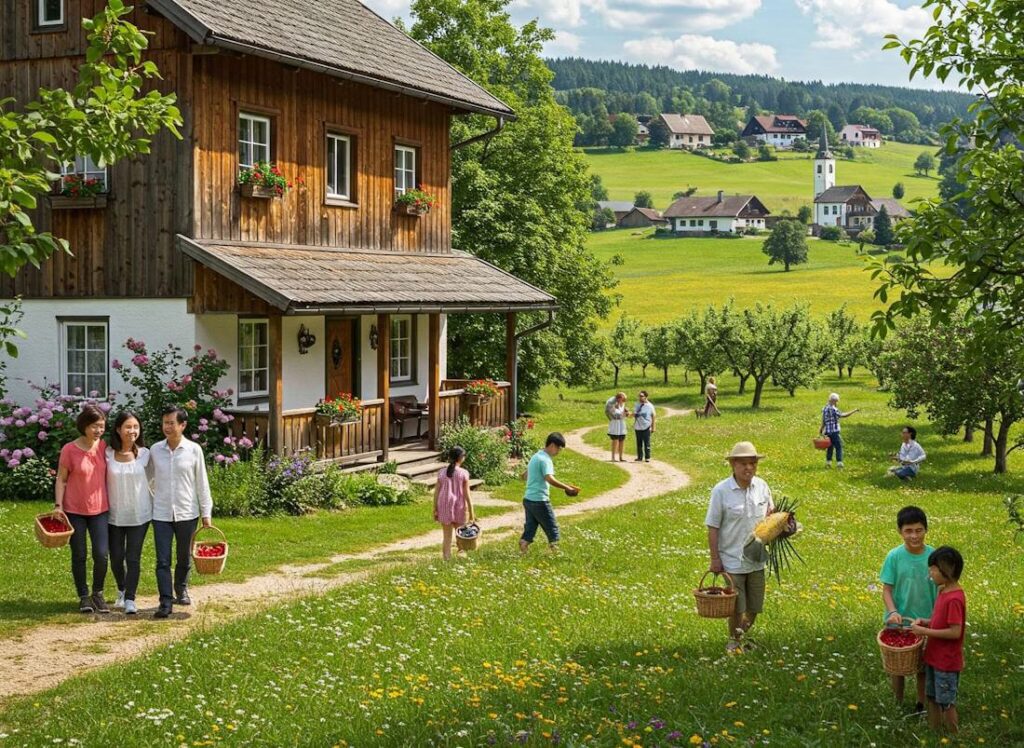Rural tourism is an emerging segment of the travel industry, distinctly characterized by its focus on natural landscapes, local culture, and community-driven experiences. Unlike urban tourism, which often emphasizes bustling cityscapes, extensive amenities, and commercial attractions, rural tourism aims to immerse visitors in the unique attributes of smaller, often less-explored regions. This form of tourism encourages tourists to savor the tranquility of the countryside while engaging authentically with local traditions, thereby fostering a deeper appreciation for the area.
As interest in meaningful travel experiences grows, rural tourism has gained traction among those seeking to escape the frenetic pace of city life. In recent years, there has been a notable shift toward more sustainable and community-oriented travel options, which highlight the importance of local engagement. Tourists are increasingly seeking authentic encounters with residents, understanding their way of life, and participating in time-honored customs. This desire for enriched experiences is what sets rural tourism apart from more traditional forms of travel.
Furthermore, rural tourism plays a pivotal role in bolstering local economies and preserving cultural heritage. By visiting rural areas, tourists not only contribute financially to local businesses, such as farms, artisan shops, and hospitality services but also foster cultural exchange. This exchange can lead to enhanced community pride and greater awareness of cultural practices among residents. In addition, rural tourism often emphasizes environmental sustainability, promoting the conservation of natural resources and the preservation of landscapes vital to local identity.
In conclusion, rural tourism represents a unique fusion of economic and cultural benefits, standing apart from conventional urban attractions. By offering travelers a chance to cultivate connections with local communities and engage with their surroundings, rural tourism paves a new pathway toward the preservation of both culture and nature.
The Impact of Tourism on Local Culture
Rural tourism serves as a vital conduit for the preservation and promotion of local cultures. By attracting visitors to remote areas, it fosters engagement with local traditions, crafts, and culinary practices that might otherwise face decline in today’s rapidly urbanizing world. One primary way tourists contribute to the enhancement of local culture is through immersive experiences that allow them to participate in age-old customs, thus creating a shared space for cultural exchange.
Tourists often seek authenticity in their travels, gravitating toward genuine local experiences that allow them to connect with the history and identity of the community. This desire can lead to a revival of traditional crafts, as artisans gain a platform to showcase their skills. Many rural regions have established workshops, where visitors are invited to learn hand-weaving, pottery, and other culturally significant arts. Such interactions not only enrich the traveler’s experience but also instill a sense of pride and economic incentive within the hosting communities, thereby reinforcing the value of these crafts.
The culinary landscape is another significant domain where rural tourism can have an impact. Tourists often indulge in regional cuisine, which highlights local ingredients and traditional cooking methods. Farms and food producers may open their doors for tours or cooking classes, allowing visitors to understand the cultural significance of their dishes, along with sustainable agricultural practices. In doing so, this not only enhances the tourist experience but also strengthens the local economy as visitors support these businesses.
Furthermore, the resulting dialogue between visitors and local residents fosters greater cultural appreciation. As tourists share stories from their own backgrounds, a bridge of understanding is formed, enriching both cultures. This exchange ultimately leads to greater awareness about the importance of preserving local customs, thereby ensuring their continuity for future generations. In essence, rural tourism not only preserves local cultures but also uplifts them, making them essential elements of the global tourism landscape.
Economic Opportunities for Rural Communities
Rural tourism serves as a significant catalyst for economic growth in less populated areas, offering a plethora of opportunities for local communities. By attracting visitors to natural landscapes, cultural heritage sites, and agricultural experiences, rural tourism generates substantial income that directly benefits local residents. This sector has the potential to create numerous job opportunities, ranging from hospitality and guide services to agriculture and local craftsmanship. The presence of tourists in rural areas not only creates positions in traditional sectors but also encourages the emergence of new industries tailored to the needs of visitors.
Local businesses, such as restaurants, shops, and craft stands, receive a boost from the influx of tourism, allowing them to prosper and expand their services. Increased foot traffic enhances sales in these enterprises, which often specialize in locally sourced products and unique cultural offerings. In turn, this fosters a sense of community pride, as local culture becomes a focal point of the tourism experience. Furthermore, when rural tourism flourishes, it encourages infrastructure development, such as improved roads, public transport, and communication systems, which can benefit residents beyond the tourism season.
Moreover, rural tourism can introduce additional revenue streams that support local economies. For instance, events like farmer’s markets, local festivals, and workshops not only attract visitors but also create a lively atmosphere that encourages longer stays and repeat visits. Local artisans and farmers can gain exposure and market their products to a broader audience, increasing their income and sustainability. Ultimately, leveraging the advantages of rural tourism can lead to resilient communities capable of supporting their members while preserving their cultural heritage and natural resources.
Developing Sustainable Tourism Practices
Sustainable tourism is increasingly recognized as a vital component of rural tourism, prioritizing both the environment and the socio-economic upliftment of local communities. The principles of sustainable tourism focus on minimizing the ecological footprint of traveler activities while fostering economic benefits for residents. In rural contexts, this approach is particularly essential as it balances the needs of tourists with the welfare of the natural environment and local cultures.
One fundamental principle is the protection of natural resources. Rural areas often boast stunning landscapes, rich biodiversity, and cultural heritage that attract visitors. Sustainable tourism practices advocate for conservation measures, such as controlled visitor access to sensitive ecosystems and the promotion of eco-friendly activities like hiking, biking, and bird-watching. These practices not only preserve the integrity of these natural resources but also create a unique selling proposition for rural destinations that highlights their commitment to environmental stewardship.
Furthermore, sustainable tourism plays a crucial role in revitalizing local economies. By encouraging visitors to engage with rural communities, tourism can direct economic benefits towards local businesses, artisans, and farmers. This is achieved through initiatives that promote locally-sourced products and services, ensuring that revenue generated from tourism circulates within the community. Implementing responsible traveler behavior, such as respecting cultural customs and supporting local enterprises, further enhances the positive impact of tourism on rural communities.
To ensure long-term success, stakeholders, including government agencies, local businesses, and community organizations, must collaborate to develop frameworks that prioritize sustainability in tourism planning. This collaborative approach fosters a sense of ownership and responsibility among locals, enhancing the overall visitor experience while safeguarding the essence of rural life. Ultimately, adopting sustainable practices in rural tourism serves not only to protect natural and cultural resources but also to generate lasting economic benefits for future generations.
Case Studies of Successful Rural Tourism Initiatives
Rural tourism has emerged as a powerful tool for community development, evidenced by numerous success stories across the globe. One noteworthy example can be found in the Azores archipelago in Portugal, where local initiatives have transformed the region into a sustainable tourism destination. The Azores focus on promoting their unique biodiversity, traditional gastronomy, and cultural heritage, such as folklore and traditional festivals. This approach not only attracts eco-conscious tourists but also reinforces local pride and cultural preservation, ensuring that indigenous practices survive while generating significant economic benefits for local residents.
Another compelling case study is that of the Scottish Highlands, where rural tourism has invigorated fragile economies. Community-led initiatives have emphasized outdoor recreational activities such as hiking, cycling, and wildlife watching, encouraging visitors to explore the stunning landscapes. Local enterprises have flourished, offering guided tours, accommodation, and artisanal products. This diversification has resulted in job creation and the revitalization of local crafts. Additionally, the efforts to maintain traditional practices, such as sheep farming and tweed weaving, have in turn fostered an appreciation for the cultural significance of these activities among tourists.
Similarly, the rural village of Gjirokastër in Albania has successfully leveraged its UNESCO World Heritage status to promote tourism, thereby revitalizing its economy while preserving its Ottoman-era architecture. Local stakeholders developed a marketing plan that highlights the village’s historical significance and natural beauty. Artisans are encouraged to engage with visitors through workshops, ensuring that traditional crafts endure. This initiative underscores the potential of collaboration among residents, government, and private enterprises in nurturing rural tourism that respects local culture and generates economic growth.
These case studies illuminate the transformative power of rural tourism. By showcasing innovative approaches, they exemplify how communities can harness their unique attributes for economic development and cultural preservation, reinforcing the importance of tailoring strategies to specific local contexts.
Challenges Faced by Rural Tourism Initiatives
Rural tourism presents various opportunities for economic growth and cultural preservation; however, it also faces a unique set of challenges that can hinder its development. One of the primary obstacles is the limitation of infrastructure. Many rural areas lack sufficient roads, public transportation, and communication facilities, which can deter potential visitors from exploring these regions. This inadequate infrastructure not only affects accessibility but also impacts the quality of services offered, ultimately resulting in a less appealing experience for tourists.
Another challenge is the seasonal nature of visitor numbers. Many rural destinations often experience fluctuations in tourism activity, with peak seasons followed by periods of low visitation. This inconsistency can make it difficult for local businesses to sustain their operations year-round. To address this issue, it is essential to diversify the types of attractions and activities available throughout the year, thus appealing to a broader audience. By promoting events, festivals, and unique experiences that highlight local culture, rural areas can attract visitors beyond the traditional peak seasons.
Cultural commodification stands as a significant concern for rural tourism initiatives. As communities adapt to accommodate tourists, there can be a risk of diluting authentic cultural practices in favor of more commercialized offerings. This phenomenon may alienate local residents and diminish the overall cultural value that attracts visitors initially. Engaging the community in tourism planning and development ensures that local traditions and practices are preserved, while simultaneously enhancing the experience for tourists. By emphasizing authentic experiences, rural tourism not only benefits local economies but also fosters cultural appreciation among visitors.
In summary, while rural tourism initiatives can lead to substantial benefits, they must navigate various challenges effectively. Through strategic planning, infrastructure development, and community involvement, rural areas can create a sustainable framework that promotes tourism while preserving their unique charm and heritage.
The Role of Technology in Enhancing Rural Tourism
The integration of technology into rural tourism has emerged as a transformative force, significantly contributing to the enhancement of visitor experiences while simultaneously supporting local economies. The advent of social media platforms such as Instagram, Facebook, and Twitter has opened new channels for marketing rural destinations, enabling them to showcase their unique cultural heritage and natural beauty to a broader audience. By sharing high-quality images, videos, and stories from visitors, these platforms can help foster a sense of community and engagement that is vital for promoting rural tourism.
Additionally, online booking platforms have streamlined the process of discovering and reserving accommodations, activities, and tours, making it easier for travelers to plan their trips to rural areas. Sites like Airbnb and Booking.com have empowered rural hosts and small businesses, allowing them to reach potential customers directly. This not only increases their visibility but also supports local artisans and service providers who may have limited marketing budgets or exposure. The ability to read reviews and access information online enhances the decision-making process for potential visitors, further driving interest in rural tourism.
Moreover, technology facilitates the creation of virtual experiences that can attract and retain visitor interest. Virtual reality (VR) and augmented reality (AR) applications allow users to immerse themselves in the landscapes, cultural events, and historical narratives of rural destinations before they even arrive. This pre-visit interaction can serve to spark interest and encourage actual visits, all while maintaining a narrative that prioritizes the voices of local communities. By incorporating technology thoughtfully and ethically, rural tourism can flourish, ensuring that it remains authentic and reflective of the unique identities of these areas.
Collaborative Efforts for Community Development
The development of effective rural tourism strategies significantly hinges on the collaborative efforts among local governments, tourism boards, and community members. This synergy is essential for establishing sustainable tourism that not only promotes economic growth but also preserves the cultural identity of rural areas. Local governments play a vital role in creating favorable policies and providing necessary infrastructure. Their support can facilitate the implementation of tourism programs that cater to both visitors and residents.
Tourism boards serve as focal points for these collaborations. They can orchestrate marketing campaigns that actively promote the unique cultural aspects of rural areas, thereby attracting visitors keen on authentic experiences. Additionally, they can organize workshops to train local entrepreneurs in hospitality and service management, ensuring that tourism development aligns with cultural preservation. Engaging local businesses in these efforts fosters a sense of ownership and encourages innovation within the community.
Community members are equally crucial in this collaborative framework. Their insights into local customs, traditions, and resources enable a more authentic representation of the region’s heritage. Involving residents in decision-making processes can lead to tourism offerings that reflect their values and needs. For instance, through focus group discussions and surveys, communities can identify the types of experiences they wish to share with visitors, such as culinary tours or traditional craft workshops.
The benefits of fostering such partnerships are manifold. They can lead to increased visitor satisfaction as tourists enjoy a richer, more personalized experience. Economic benefits are also notable; successful rural tourism can create jobs, stimulate local businesses, and enhance the overall quality of life in communities. Therefore, the collaboration among various stakeholders not only enhances the effectiveness of rural tourism initiatives but also ensures that its growth is reflective of the unique cultural fabric of the community.
Conclusion: The Future of Rural Tourism and Cultural Preservation
Rural tourism emerges as a significant catalyst for both economic growth and cultural preservation. As highlighted throughout this blog post, engaging in rural tourism is not merely a trend but a thoughtful approach to connecting with local communities while nurturing their unique cultural heritage. By choosing rural destinations, travelers can foster a deeper understanding of the customs, traditions, and history that shape these regions, which are often overlooked in more urbanized travel experiences.
One pivotal insight is that rural tourism generates income opportunities for local populations, ensuring that communities can sustain their way of life. Revenue from tourism helps support local businesses, craftspeople, and service providers, creating a ripple effect that strengthens the overall economic structure of rural areas. This financial boost can lead to improved infrastructure and services, making these regions more attractive to visitors while enhancing the quality of life for residents.
Moreover, tourism in rural settings encourages the preservation of cultural practices and landscapes. By promoting local arts, crafts, and culinary traditions, rural tourism safeguards the intangible heritage that might otherwise fade away. Travelers who seek authentic experiences are motivated to support traditional practices, thereby reinforcing the local identity and traditions that define these communities.
As we look toward the future, it becomes evident that rural tourism holds promise as a sustainable alternative for contemporary travel. It offers not only economic benefits but also a means of fostering genuine connections between visitors and locals. By supporting rural tourism, travelers can contribute to the preservation of vibrant cultures while enjoying enriching experiences. Thus, embracing rural tourism can lead to more meaningful, culturally immersive travels, ensuring that the delicate fabric of local traditions and economies remains intact for future generations.



